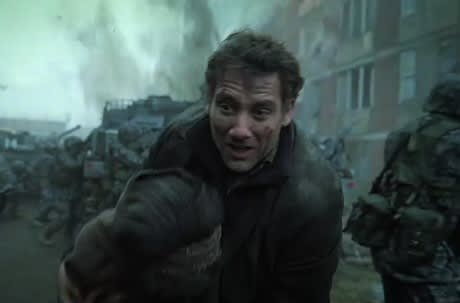Theo (Clive Owen, in perhaps his best role to date) wakes up day after day, goes to work and feels—if he feels anything—like shit. As director Alfonso Cuarón (Y Tu Mama Tambien) describes him, Theo is a "veteran of hopelessness." He's also our rudderless anchor to the year 2027 and neither he nor the space he inhabits mesh with the flashy cinematic visions we've come to expect of a hero or the future. With its bland buildings, clunky vehicles and demoralized people, the environment depicted seems a stylized version of the present.
Children of Men, adapted from P.D. James' novel, is a world of grey and brown, of fog and dirt, of revolt and resignation. It is a despairing place where global infertility has reigned for almost two decades and the youngest human—an 18-year-old—has just been killed after spitting in a stranger's face. No explanation is provided for the epidemic, which makes it all the more ominous. These are the dusking days of humankind. How can there be life, let alone hope, in a world where there is literally no future to speak of, where there will soon be no one left to mourn or remember?
The battles—ideological and arms-related—between British institutional forces and activist sects fighting for refugee rights are only vaguely fleshed out, serving to provide a bleak backdrop of everyday violence and oppression for the tale at the core of this film: a young refugee woman is eight months pregnant and in need of asylum. Kee (Clare-Hope Ashitey) holds the fate of the world in her belly and, through a series of unexpected turns, Theo, like a modern-day Joseph, becomes her guardian in the journey to safety.
The impeccable cast brings gravity and grace to each moment, making it impossible to imagine any other actor or actress in the significant roles. Clive Owen, whether cursing or crying, stumbling or striving, is a quiet revelation. Never before has an actor wearing flip-flops evinced such warmth and pathos.
Cuarón's film is many things—a parable about the endurance of hope, an evisceration of late capitalism, a critique of war zones, immigration policies and globalization, an environmental allegory, a hero's journey—but at its best, it is simply bold, powerful, mesmerizing storytelling. Children of Men manages to make all of its commentary in an oblique way, free from heavy-handed didacticism. So while you might be subconsciously making thematic connections between our 2012 and the celluloid 2027, the perfect pacing of the plot ensures that you will be actively immersed in the very human drama unfolding onscreen.
For better or worse, whether an evolutionary advantage or an inadvertent adversary, our survival instinct—that unassailable desire to live and to propagate—is indomitable. Our capacity for optimism seems limitless, if occasionally misguided. This buoyancy, this faith in a successful outcome or confidence about the future, can make humans feel impervious to the disaster they know exists, but continually push to the periphery, into the distance. Children of Men harnesses the very human tendency to hope, acknowledging its role as enemy and ally, and ends with a fragile, tenuous glimpse of survival.
Children of Men screens at the TIFF Bell Lightbox as part of the Countdown to Armageddon screening series at 9:15pm on Monday, December 17th, 2012.
(Universal)Children of Men, adapted from P.D. James' novel, is a world of grey and brown, of fog and dirt, of revolt and resignation. It is a despairing place where global infertility has reigned for almost two decades and the youngest human—an 18-year-old—has just been killed after spitting in a stranger's face. No explanation is provided for the epidemic, which makes it all the more ominous. These are the dusking days of humankind. How can there be life, let alone hope, in a world where there is literally no future to speak of, where there will soon be no one left to mourn or remember?
The battles—ideological and arms-related—between British institutional forces and activist sects fighting for refugee rights are only vaguely fleshed out, serving to provide a bleak backdrop of everyday violence and oppression for the tale at the core of this film: a young refugee woman is eight months pregnant and in need of asylum. Kee (Clare-Hope Ashitey) holds the fate of the world in her belly and, through a series of unexpected turns, Theo, like a modern-day Joseph, becomes her guardian in the journey to safety.
The impeccable cast brings gravity and grace to each moment, making it impossible to imagine any other actor or actress in the significant roles. Clive Owen, whether cursing or crying, stumbling or striving, is a quiet revelation. Never before has an actor wearing flip-flops evinced such warmth and pathos.
Cuarón's film is many things—a parable about the endurance of hope, an evisceration of late capitalism, a critique of war zones, immigration policies and globalization, an environmental allegory, a hero's journey—but at its best, it is simply bold, powerful, mesmerizing storytelling. Children of Men manages to make all of its commentary in an oblique way, free from heavy-handed didacticism. So while you might be subconsciously making thematic connections between our 2012 and the celluloid 2027, the perfect pacing of the plot ensures that you will be actively immersed in the very human drama unfolding onscreen.
For better or worse, whether an evolutionary advantage or an inadvertent adversary, our survival instinct—that unassailable desire to live and to propagate—is indomitable. Our capacity for optimism seems limitless, if occasionally misguided. This buoyancy, this faith in a successful outcome or confidence about the future, can make humans feel impervious to the disaster they know exists, but continually push to the periphery, into the distance. Children of Men harnesses the very human tendency to hope, acknowledging its role as enemy and ally, and ends with a fragile, tenuous glimpse of survival.
Children of Men screens at the TIFF Bell Lightbox as part of the Countdown to Armageddon screening series at 9:15pm on Monday, December 17th, 2012.
